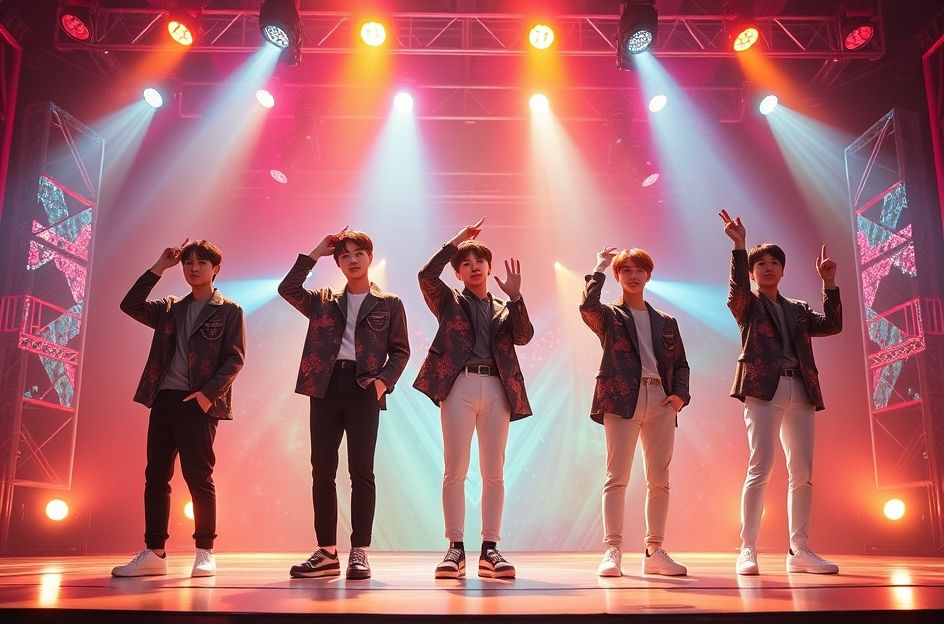BIGHIT MUSIC's New Boy Group CORTIS Brings Fresh Wind to K-Pop Industry
BIGHIT MUSIC, the powerhouse behind global superstars BTS and Tomorrow X Together (TXT), has unveiled its newest boy group after a six-year hiatus from debuting male acts. Five-member group CORTIS officially debuted on August 18 with their title track "What You Want," followed by their first EP "COLOR OUTSIDE THE LINES" released on September 8, bringing a revolutionary approach to the saturated K-pop market.
For American readers unfamiliar with K-pop industry dynamics, BIGHIT MUSIC's decision to debut a new boy group carries immense significance. In the Korean entertainment industry, agencies like BIGHIT are similar to major American record labels, but with far more comprehensive artist development and management. The company's previous successes with BTS (who achieved multiple Billboard #1 albums) and TXT have established them as one of the most influential K-pop agencies globally, making any new group debut a major industry event.
The group's name CORTIS derives from the phrase "COLOR OUTSIDE THE LINES," with six letters irregularly selected to represent their philosophy of "breaking free from world's established standards and rules to think freely." This naming convention reflects a departure from traditional K-pop group naming patterns, signaling BIGHIT's intention to position CORTIS as genre innovators rather than followers of established formulas.
Teen Creator Revolution in K-Pop
What sets CORTIS apart from their predecessors and contemporaries is their identity as a "Young Creator Crew" – all five members are teenagers who actively participate in music production, choreography creation, and video production. The members Martin, James, Juhoon, Sunghyun, and Gunho represent a new generation of K-pop artists who blur the lines between performers and creators, a concept that parallels the American music industry's increasing emphasis on artist authenticity and creative control.
To understand the significance of this approach for American audiences, consider that traditional K-pop has been criticized for its highly manufactured nature, similar to early American boy bands like *NSYNC or Backstreet Boys. CORTIS's creative involvement represents a shift toward the American model where artists like Taylor Swift, Drake, or The Weeknd are celebrated for their songwriting and production contributions. The group's pre-release song "GO!" featured a music video entirely planned, filmed, and edited by the members during their trainee period, demonstrating their hands-on creative approach.
This creative autonomy is particularly noteworthy in the context of Korea's entertainment industry, where trainee systems typically involve years of rigorous training under strict company guidance. For American readers, imagine Disney Channel stars being given complete creative control over their projects – it represents a fundamental shift in how Korean entertainment companies approach artist development.
Bang Si-hyuk's Strategic Vision
The debut of CORTIS marks more than just another group launch; it represents BIGHIT MUSIC's strategic positioning following its separation from HYBE Corporation. With Bang Si-hyuk serving as executive producer and industry veterans Supreme Boi and Hiss Noise as main producers, CORTIS becomes the first idol group to debut under the independent BIGHIT MUSIC banner, carrying symbolic weight for the company's future direction.
For American audiences, Bang Si-hyuk's role in K-pop parallels that of legendary producers like Quincy Jones or Dr. Dre in American music – industry visionaries who shape not just individual careers but entire musical movements. His involvement in CORTIS signals the group's importance to BIGHIT's long-term strategy of maintaining relevance in the post-BTS era, as the industry anticipates how the company will sustain its global influence.
Industry analysts compare CORTIS's positioning to how American record labels handle legacy acts and new talent. Just as Atlantic Records must balance supporting established artists while developing new ones, BIGHIT faces the challenge of maintaining BTS and TXT's momentum while launching fresh acts. The fact that all CORTIS members receive album credits for their creative contributions represents a significant departure from traditional K-pop production methods, aligning more closely with Western music industry practices.
Member James's journey particularly illustrates BIGHIT's artist development philosophy. As the sole remaining member from the former trainee group Trainee A to successfully debut, his story reflects the company's long-term investment approach – similar to how American labels might nurture promising artists through various projects before finding the right fit. This patience-focused strategy contrasts sharply with the rapid turnover typical in competitive entertainment markets.
Market Disruption and Industry Impact
CORTIS's emergence addresses growing concerns about K-pop market saturation, offering a potential solution through their creator-focused identity. In a market where dozens of new groups debut monthly, CORTIS's emphasis on authentic creativity over polished perfection could resonate with global audiences seeking more genuine artistic expression, paralleling recent American music trends favoring authenticity over production perfection.
For American music industry observers, CORTIS represents an interesting case study in how established entertainment companies adapt to changing consumer preferences. Their approach mirrors the American indie music movement's influence on major labels, where authenticity and creative control have become selling points rather than obstacles to commercial success.
The global implications of CORTIS's success or failure extend beyond music into cultural diplomacy. As K-pop continues serving as South Korea's primary cultural export – similar to how hip-hop represents American culture globally – new groups like CORTIS carry responsibility for maintaining Korea's cultural influence while innovating for future generations.
Moving forward, CORTIS faces the dual challenge of living up to their labelmates' unprecedented success while establishing their unique identity. Their ability to balance creative authenticity with commercial viability will likely determine not only their own trajectory but also influence how other K-pop agencies approach artist development in an increasingly competitive global market.
As the group continues building their international presence, American audiences can expect to see CORTIS applying their creator philosophy to bridge cultural gaps, potentially offering a more accessible entry point into K-pop for Western listeners who appreciate artist authenticity and creative involvement.
Source: Korean original article



0 Comments